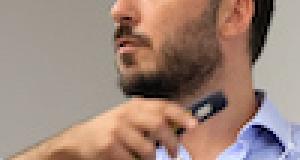
Notizie
Position
Full Professor – Dipartimento di Fisica
Contact details
Dipartimento di Fisica, Fermi Building, 5th Floor, Room 506
Sapienza Università di Roma
Piazzale Aldo Moro 2
00185 Roma, Italia
T (+39) 06 4991 3518 (office)
T (+39) 06 4969 3294 (lab)
roberto.dileonardo[at]uniroma1.it
http://www.dileonardolab.it
Main research activities
Soft matter, active matter, statistical mechanics, microhydrodynamics, biophysics, synthetic biology, digital holography, microscopy, optical micromanipulation.
Brief profile
Roberto Di Leonardo is Full Professor at the Physics Department of Sapienza University in Rome. He is interested in the origins, the consequences and the applications of motion at the micron scale, from Brownian motion to cell motility. To study that, his lab builds digital microscopes that integrate optical and computer hardware and where light can be used for imaging, manipulation and fabrication of microsystems in 3D. Di Leonardo has a PhD in Physics from the University of L’Aquila where he worked on supercooled liquids and glass transition. He then moved to Rome to join the Center for Soft Matter Research of the National Research Council. As a Research Fellow at the University of Glasgow he became interested in the use of light as a tool for manipulating matter on the micron scale. In 2009 he began studying flagellar propulsion, focusing in particular on the possibility of exploiting motile bacteria as a source of work in miniaturized devices. More recently, his interest has shifted towards synthetic biology as a tool for reprogramming bacteria to be the smart atoms of novel active materials. He is the author of more than 100 research papers on topics ranging from experimental optics to statistical mechanics. He was Junior Fellow of the School for Advanced Studies Sapienza (SASS 2013-2019), recipient of a Presidential Medal in Italy (Premio Le Scienze 2007) and an ERC grantee (Starting Grant 2012, Proof of Concept Grant 2017, Advanced Grant 2018).
Orari di ricevimento
Tutti i giorni 9-18 su appuntamento da concordare per email.
Insegnamenti
| Codice insegnamento | Insegnamento | Anno | Semestre | Lingua | Corso | Codice corso | Curriculum |
|---|---|---|---|---|---|---|---|
| 1055361 | BIOPHYSICS | 1º | 2º | ENG | Physics - Fisica | 33602 | Condensed matter physics: Theory and experiment (Percorso valido anche per coloro che partecipano al percorso internazionale italo-francese-portoghese-canadese finalizzato al conseguimento del titolo multiplo) |
| 1055361 | BIOPHYSICS | 1º | 2º | ENG | Physics - Fisica | 33602 | Statistical Physics and Complexity |
| 1055361 | BIOPHYSICS | 1º | 2º | ENG | Physics - Fisica | 33602 | Physics of Biological Systems |
| 1055361 | BIOPHYSICS | 1º | 2º | ENG | Physics - Fisica | 33602 | Condensed matter physics: Theory and experiment (Percorso valido anche per coloro che partecipano al percorso internazionale italo-francese-portoghese-canadese finalizzato al conseguimento del titolo multiplo) |
| 10612078 | INTRODUZIONE ALLA FISICA DEI SISTEMI BIOLOGICI | 3º | 1º | ITA | Fisica | 33588 | Fisica applicata |
